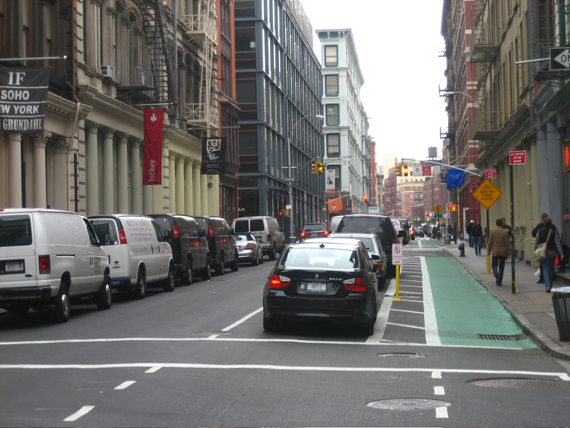Physical Address
304 North Cardinal St.
Dorchester Center, MA 02124
Physical Address
304 North Cardinal St.
Dorchester Center, MA 02124

Last week I wrote a piece for City Journal on how smart parking could allow New York City to implement variable pricing. Street parking sensors allow prices to change to maintain an empty spot on each block, as parking expert Donald Shoup recommends. By eliminating the incentive to drive around looking for parking, this policy could drastically reduce traffic congestion and save drivers significant amounts of time.
All of the comments on my post argue that charging for parking according to demand would increase the cost of living in already expensive cities and hurt low-income people. While this argument is very common among supporters of underpriced street parking, it’s false. In actuality, today’s standard policies of underpriced street parking and off-street parking requirements increase costs of living, and low-income people bear a disproportionate share of the costs of these policies.
Properly implemented variable pricing systems may not even increase the total price that drivers pay to park their cars. San Francisco has gone farther than any other city to implement variable parking. Its SFPark system updates the prices on the city’s meters periodically with the goal of keeping the occupancy on each block below 80%. While this objective has led to significant price increases for the most in-demand blocks, it has actually reduced the city’s total parking meter revenues because prices were allowed to fall on many blocks to reach the 80% target.
Whether they cause total parking meter revenue to increase or decrease, variable parking prices are key to reducing off-street parking requirements, which is a huge cost of development. The political pressure for off-street parking often stems from homeowners who live near commercial destinations. Because people who drive to businesses prefer free parking to paid parking, they may park in a zero-price curb spot in a residential neighborhood near their destination rather than at a paid spot on the commercial street. This increases traffic in the neighborhood and reduces parking availability for residents. Residents then demand that businesses provide their patrons with enough free on-site parking to eliminate the demand for free nearby curb spots.
While off-street parking requirements reduce demand for street parking, they also create a significant cost for businesses. Shoup estimates that “the total subsidy for parking (the total cost of parking not paid for by drivers in their role as parkers) … was between $127 billion and $374 billion, or between 1.2 percent and 3.6 percent of the gross domestic product” in 2002. Some businesses would undoubtedly provide free parking for their customers without parking requirements, but these regulations cause developers to build more parking than they otherwise would. The cost of these mandatory spaces is ultimately passed on to consumers, resulting in higher prices for everything that we buy. This parking tax is like a sales tax on all consumer goods, and because it eats up a larger portion of low-income budgets than high-income budgets, it’s regressive.
Ultimately, parking requirements that are repeated on every lot across a city lead to an environment in which destinations are very spread out from one another. This sprawl makes living without a car more difficult. Foregoing a car can save households of any income level thousands of dollars per year, an option that can provide low-income households in particular with the choice to free up a large percentage of their budget for other priorities, but its an unattractive choice in many American cities that have been shaped by parking requirements.
Variable street parking prices will increase the cost of car ownership for drivers who prioritize parking in highly-demanded spots. However, city residents can avoid these charges by parking in places out of the way, varying the times of their trips to avoid peak-pricing, not driving to destinations that will require expensive parking, or even choosing not to own a car entirely. Pricing parking high enough to eliminate queuing for spots will require drivers to pay for their spots with their money rather than their time, but people at any income level face choices that allow them to reduce their parking costs. Current parking policy is an unavoidable regressive tax, and pricing street parking to manage its demand is the first step toward reform.
Seems to me that one of the most important rhetorical points in making this argument to the public should be not only the egregious equity problem — the poorest 15% of a city’s population get totally screwed by “free” parking — and conveying the fact that even people who are driving are already paying for parking.
Of course, this leads to the usual denials that prices depend on the cost of providing goods and services — “even if that were true, the grocery store won’t cut its prices, it’ll just charge me for parking and pocket the money” — but I’ve found that “poor people are already paying for parking in the price of every apple” seems to be a decent counter to the “my having to pay for parking would hurt poor people” concern trolling that comes so naturally to rich people.
it should be noted, also, the residents are generally not paying for parking in their own neighborhoods – they are using the free parking on residential blocks, frequently protected by nominal-cost RPP permits.
Also protected by strict limits on the number of housing units allowed in the area, to prevent overuse of the free parking. Which results in high housing costs– particularly galling when these areas are also the areas where you could live most easily without a car.
[…] Free parking isn’t free Market Urbanism […]